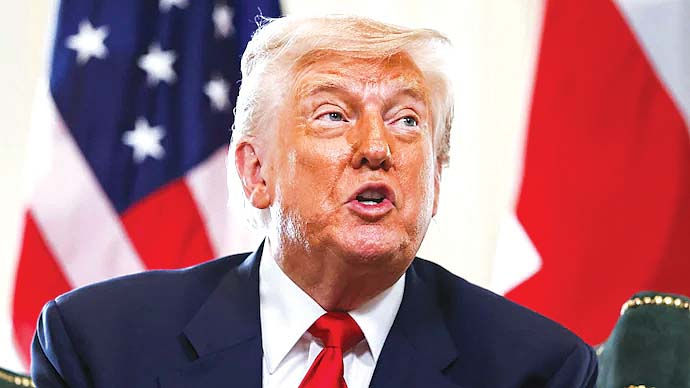Trump, tariffs and the test for India’s opposition
- Prasad Dixit

- 6 days ago
- 4 min read
Rather than indulging in what-aboutery, the opposition must show what responsible dissent looks like in a democracy.

In India’s noisy democracy, civility has become a scarce commodity. The tone of debate—in television studios, press conferences and parliament itself—has coarsened beyond recognition. Those who recall earlier decades speak wistfully of an era when political opponents still treated one another with courtesy, and when the opposition, while critical, stood by the government at moments of national trial.
In the early years after independence, Jawaharlal Nehru was known for treating his adversaries with respect. Indira Gandhi, during the 1971 war with Pakistan, received unflinching support from across the aisle, without bickering over numbers of casualties or costs. In 1991, when India’s economic model collapsed and the government was forced into radical liberalisation, opposition parties lent the minority Congress government crucial backing, refraining from opportunistic attacks. Even in the fractious 1990s, when instability was the norm, the rapport between P.V. Narasimha Rao and Atal Bihari Vajpayee was such that Rao nominated his rival to represent India at the United Nations in Geneva.
Such anecdotes are often attributed to the Congress party’s supposedly democratic character. Yet that view misses the asymmetry of the times. In the first three decades after independence, the opposition was weak, fragmented and posed little threat to the ruling party. It was easy for Congress to act magnanimous when it was secure in its dominance. As opposition forces began to mature, forming governments of their own, the calculus changed. After 2014, when the Bharatiya Janata Party (BJP) became the first non-Congress party to win a majority in parliament on its own, cordiality largely evaporated.
The change is visible in parliamentary debates. Unlike 1971, when the opposition rallied behind the government, the debate over Operation Sindoor saw opposition MPs ask whether America had mediated the ceasefire and demand casualty figures, ignoring India’s stated position that Pakistan alone could halt escalation. More recently, opposition leaders have raised doubts about electronic voting machines (EVMs), questioned voter lists, and demanded contradictory electoral reforms: digital voter rolls on the one hand, a return to ballot papers on the other. The same ambivalence was seen on economic policy. The farm laws, in line with India’s own liberalisation agenda of 1991, were opposed in the streets. The Goods and Services Tax (GST), long advocated as a unifying reform, was derided as the “Gabbar Singh Tax.” India’s growing stature abroad, inevitably provoking counter-moves by adversaries, was portrayed as a failure of foreign policy.
It is true, of course, that the BJP was guilty of similar behaviour when in opposition. It opposed Aadhaar, multi-brand retail, GST and disinvestment, only to embrace them once in power. It also stalled parliament and justified obstruction as a democratic weapon. Yet there is an important distinction. The BJP had little experience of governing on its own. It had not grappled with the hard trade-offs of power: between populism and prudence, between short-term pain and long-term gain, between national aspiration and international compulsion. The Congress had. Having presided over wars and economic crises, it knew the importance of a responsible opposition in moments of national trial.
That makes the present failure more glaring. The ruling party can always differentiate itself through governance. But the opposition, particularly the Congress, with its long years of experience, had the chance to differentiate itself by embodying the democratic responsibility it once claimed as its hallmark. Instead, it has allowed itself to be dragged into the same cycle of obstruction and what-aboutery it once decried.
History offers a sobering lesson. In 1971, unity at home helped India prevail on the battlefield. In 1991, political consensus made radical reform possible. Today India faces challenges of comparable scale: a volatile security environment and mounting economic pressures, not least from the United States, whose administration has shown a readiness to weaponize tariffs against India. These are moments that call for national resolve, not partisan sniping.
The temptation to fish in troubled waters is strong. Raising doubts about institutions may win airtime and energise a party base. But it corrodes trust in democracy itself. Opposing reforms for the sake of opposition may yield temporary advantage but leaves the country weaker in the long run. When opposition leaders disparage India’s rising global profile as a failure, they signal to foreign capitals that domestic politics may yet undo what diplomacy achieves.
None of this is to suggest that the opposition should fall silent. Its duty is to question, scrutinise and challenge. A responsible opposition does not rubber-stamp government policy. But it does distinguish between issues of partisan politics and matters of national interest. It offers alternatives instead of only obstruction and opportunism.
The Congress and its allies insist that their stance is no different from what the BJP once adopted. But that is precisely the point. India cannot afford an opposition that is merely a mirror image of the ruling party at its worst. A weary electorate, cynical of constant acrimony, might well reward the first party that demonstrates maturity.
India’s opposition today faces a choice. It can continue trading insults and suspicions, questioning institutions and rejecting reforms, thus hoping to score points against the government. Or it can rise to the occasion by showing that it has learned from history and that it understands what it means to oppose responsibly in a democracy.
Tariffs from Washington and turbulence on the borders are stark reminders that India’s challenges do not pause for domestic squabbles. The government will respond with policy. Whether the opposition responds with maturity will determine not just its own fortunes, but the health of Indian democracy.
(The author works in the Information Technology sector. Views personal.)




Comments